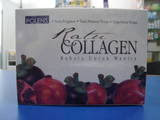TIME NOW !!
Tuesday, December 22, 2009
URUTAN WAJAH
Muka akan tampak berminyak terutamanya selepas bangun daripada tidur. Sebenarnya, itulah masa sesuai untuk mengurut wajah. Gunakan jari telunjuk kedua-dua belah tangan. Mula letakkan kedua-duanya di bawah mulut (dagu). Pusingkan jari ke pipi, pipi ke hidung seterusnya ke bahagian dahi. Perlu diingat, jangan sesekali mengurutnya cara menurun kerana ia kan menpercepatkan proses kedutan di wajah. Buatlah setiap pagi disusuli dengan meminum air suam sebelum mengambil sarapan pagi.
Subscribe to:
Post Comments (Atom)




No comments:
Post a Comment